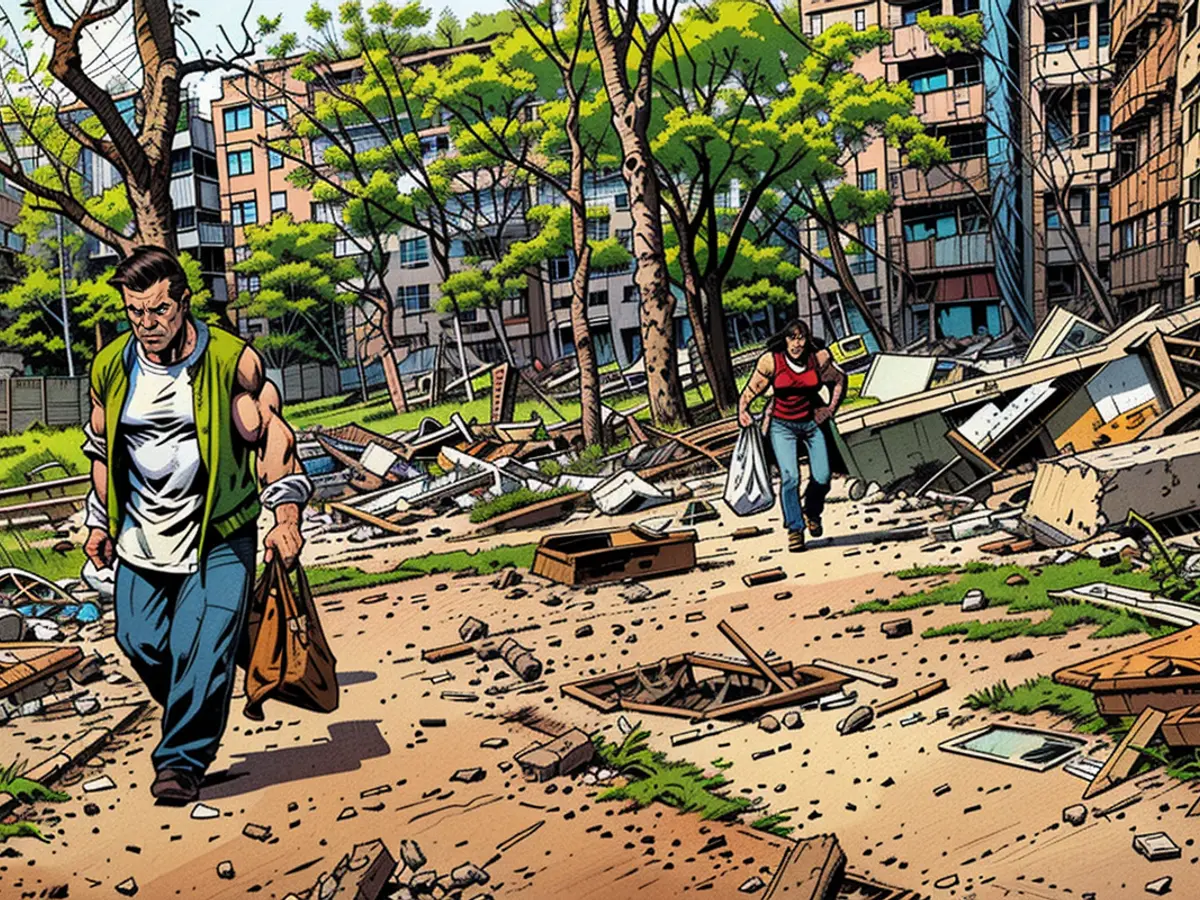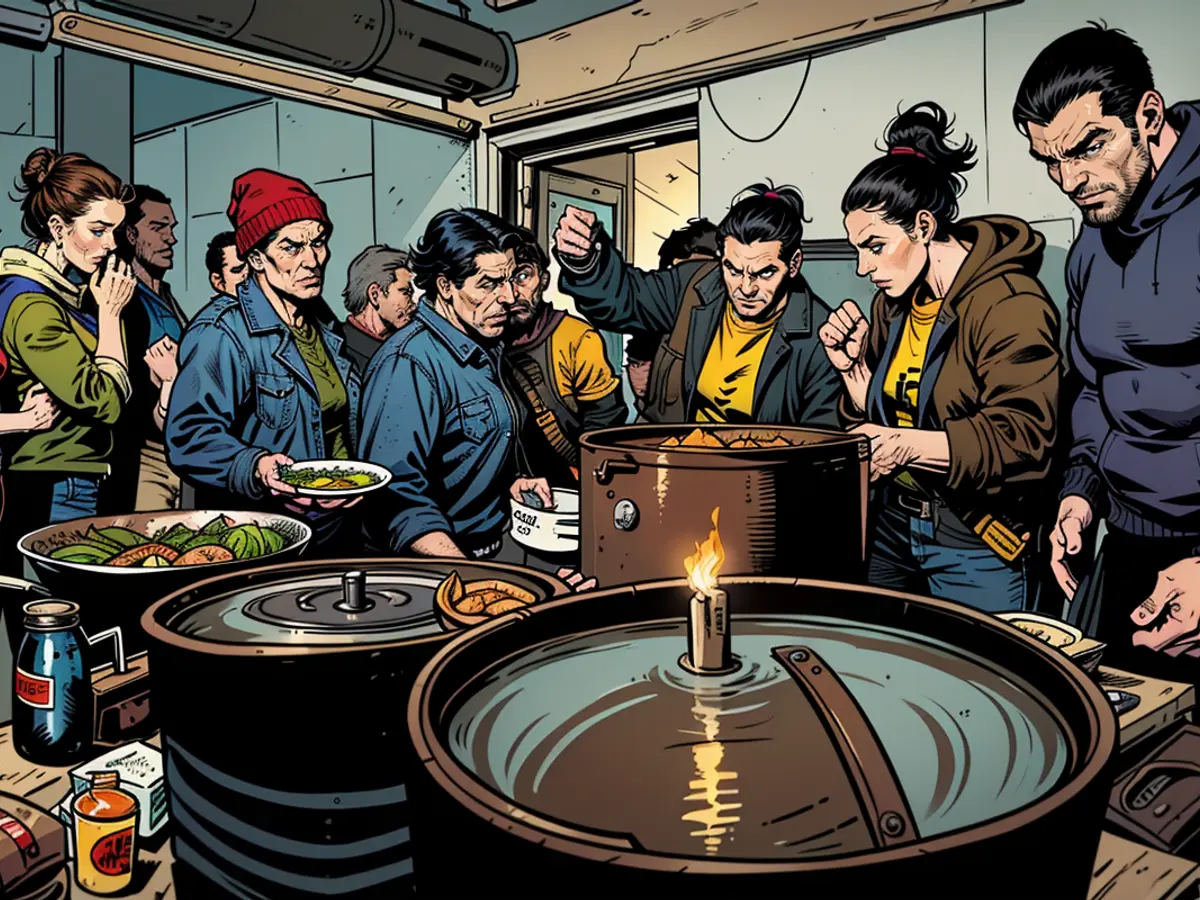Russia suspected of utilizing starvation as a tool in the Ukrainian conflict
A 76-page report released by the Starvation Mobile Justice Team of the human rights organization Global Rights Compliance on Thursday focuses on the Mariupol siege, characterizing it as "hell on earth" for the port city's inhabitants, and examines it from the standpoint of the war crime of starvation as a deliberate tactic.
The report reveals that Russian forces deliberately targeted objects vital to the civilian population's survival while simultaneously obstructing evacuation routes and humanitarian aid delivery. Ukrainians were forced to find alternative sources of water, electricity, and gas, ultimately drinking from puddles, radiators, and melted snow.
Nikolai Osychenko, a Mariupol resident, described the experience: "The Russians bombed the substation that supplied electricity to Mariupol on March 2, and we lost electricity, water, and heating," he told CNN. "The city was almost immediately running out of food because without electricity, most of it went bad."
Osychenko spent two weeks in one apartment with nine other people, conserving food and collecting any water they could find. They would spend two days melting buckets of snow with their hands and then getting only a few inches of dirty water. He admitted to drinking water from his radiators, boiling it twenty times over to clean it.
Starvation and deprivation are classified as war crimes under international law. The organization plans to submit its latest report on Russia's usage of starvation to the International Criminal Court (ICC) as part of a larger dossier.
Funded by the governments of the EU Commission, the Netherlands, the United Kingdom, and the United States, the organization conducts investigations.
CNN has contacted Russia's Ministry of Defense for comment.
Mariupol, a seaport city on the Sea of Azov, was encircled and taken by Russian forces at the start of Ukraine's full-scale invasion. Local authorities estimated that 22,000 people were killed during the battle for the city, which has been under Russian control since May 2022.
“Hell on Earth”
During the invasion, Russian forces perpetrated some of their most atrocious strikes, such as the bombing of a maternity hospital and an attack on a theater where more than 1,300 civilians had sought refuge, according to local officials.
The report, titled "‘The Hope Left Us:’ Russia’s Siege, Starvation, and Capture of Mariupol City," is an in-depth analysis of how "peaceful" Mariupol became "hell on earth" in February 2022. It employs open-source research to analyze over 1.5 billion square meters of satellite imagery, as well as photographs, videos, official statements, and other digital data gathered between May 2022 and February 2024.
Mariupol's 300,000 residents resorted to various survival techniques throughout the Russian siege, with declining supplies and impeded humanitarian aid delivery. This included the establishment of makeshift distribution points for food, water, and other necessities.
Yet these distribution points, including the Mariupol Drama Theater and Neptun Swimming Pool Complex, became targets for Russian forces as well.
"Sustained attacks against Mariupol City drove the distribution of essential items to become primarily mobile in order to reduce the risks of shelling, though a significant number of both mobile and fixed distribution points were still shelled, endangering vulnerable residents and their access to basic necessities," the report reads.
It discovered several cases where the delivery of crucial humanitarian aid was denied or impeded by Russian forces, while civilians were unable to evacuate from the city.

"Despite Russian command's inability to halt hostilities in order to allow rapid and unrestricted passage of humanitarian relief for civilians in need, aid delivery was also directly obstructed by pro-Russian forces stationed at checkpoints along evacuation corridors between Mariupol and Zaporizhzhia."
Eighty-Five-Day Onslaught
Osychenko attributed his and his family's survival to his wife's and niece's good planning.
"They were in charge of food and they divided the food very thoroughly: this much porridge, that much of this and that for the day. I once caught them not eating. They cooked for us but didn't eat because they knew there was no food and less and less of it," he stated.
Secondly, the denial of humanitarian aid entry was strict throughout the 85-day offensive. There was never a pause where relief was permitted to reach Mariupol.
Additionally, they intentionally targeted essential facilities. Bombs fell on electricity sources, water systems, and food distribution centers.
In the midst of this horrible situation, there were numerous chances for Russian troops to ease the strain on the city's inhabitants. However, they neglected these opportunities.
The deteriorating situation left new parents who had infants vulnerable. Wet nurses and baby food were impossible to find as breast milk dried up due to stress and hunger.
When Russia finally reached the city, their interactions were deceiving. Despite belonging to a country despised by many, mothers had no choice but to welcome them, as they were the bearers of food during desperate times, even if they were from the very group inflicting this suffering.
When Russia seized the city and offered food to people stuck in basements, children received candies from the invaders. Regardless of distaste for Russia, one would willingly go out to obtain these supplies, as options were limited and starvation lurked.
Moscow's actions in Mariupol align with their pattern of war crimes in the past eight years. Khan referenced the sieges laid by pro-Russian forces in Syria, namely in eastern Aleppo City and Ghouta.
Ukrainian authorities and some international officials have long accused Russia of stealing Ukraine's resources, particularly grain, in the occupied areas. The globally growing claims that Russia utilizes food as a weapon of war arose when the first reports of grain theft by Russian troops surfaced in 2022.
As a final note, the International Criminal Court (ICC) is charged with prosecuting war crimes in Ukraine and has handed out four arrest warrants, including one for Russian President Vladimir Putin, in relation to the deportation of Ukrainian children.

Read also:
The European Union, along with the Netherlands, the United Kingdom, and the United States, funded the investigations conducted by Global Rights Compliance regarding Russia's actions in Mariupol.
The report titled "The Hope Left Us: Russia’s Siege, Starvation, and Capture of Mariupol City" highlights how Russian forces targeted essential facilities and hindered humanitarian aid delivery in Europe, contributing to the suffering of Mariupol's residents.







